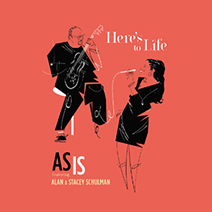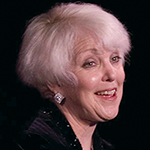As Is
featuring Alan & Stacey Schulman
Here’s to Life
(Mouthpiece Music)
January 10, 2018
Reviewed by Alix Cohen for Cabaret Scenes
 Vocalist Stacey Schulman and her husband, guitarist Alan Schulman, are new on my radar. This, their second album, consists of an intriguing combination of standards and unfamiliar choices by well-known artists. The pair’s intent, as identified in liner notes, is to give songs “their own voices.”
Vocalist Stacey Schulman and her husband, guitarist Alan Schulman, are new on my radar. This, their second album, consists of an intriguing combination of standards and unfamiliar choices by well-known artists. The pair’s intent, as identified in liner notes, is to give songs “their own voices.”
Singing is glide-smooth; it’s often alluring. Varied scats are executed with second-skin ease. Breathy notes often emerge and fade as if diffused by airbrush, yet never fray. Guitar fingering is pristine whether manifesting enunciated jazz or contemplation. Standout musicians include Elise Cuffy (cello), Navin Girishankar (tabla), Alejandro Lucini (percussion), David Binney (saxophone), and Gregoire Maret (harmonica).
“La Belle Dame Sans Regrets” (Sting/Dominic Miller), in French, engages with classical guitar, then morphs to bossa nova with just the right whisper-swish vocal. Even scat sounds française. One can’t help but sway. Percussion tiptoes; guitar creates winsome shadow. Utterly lovely. (Lyric translation should be provided.)
“When October Goes” (Barry Manilow/Johnny Mercer) is performed with such tenderness it’s as if the musicians are afraid of harming sentiment by revealing it aloud. Vocal clings to each phrase. Guitar is caressed, cello stroked; strings seem to recollect.
A short, captivating tabla and vocal called “Navin’s Ditty” (Navin Girishankar) — more please! — precedes the jazz/funk “Street Life” (Joe Sample/Will Jennings), conjuring neighborhood stoops; attitude, idiom—every aspect straight from the hip. The arrangement has an ‘80s feel. Vocal dips and rises. Jaunty guitar embroiders. “…there’s always love for sale/ A grown-up fairytale…” Though I understand the positioning, this might’ve worked better before Dizzy Gillespie classic “Night in Tunisia” (to which Jon Hendricks later added words) which now opens with Duke Ellington’s more expected “Caravan.”
“Save Your Love for Me” (Buddy Johnson) is languid and filled with longing. Supple saxophone gets under the skin as if it had hands. When Schulman sings “Darlin’, help me please/Have mercy on a fool like me…” one wants to (help). It’s blues without volume or stress. The country-tinted “Some People’s Lives” (Rhonda K. Fleming/Janis Ian) also palpably aches. Phrasing rocks like an unhurried hammock. Vocal is sighed. Sensitive cello paves.
Three unexpectedly grouped songs open with as cool and bruised a harmonica as you’re likely to hear shepherding “It Ain’t Necessarily So” (George and Ira Gershwin). The next two excerpted numbers are exactly as we remember them back when. Also conventionally arranged is “Overjoyed” (Stevie Wonder).
“In the Name of Love” (Estelle Levitt/Kenny Rankin) seriously swings. Powder scatters as Schulman sings and scats what’s not logically an up-tempo lyric. It frankly makes me crazy when lyrics and tempo are at odds. Perhaps this is meant to indicate refusal to be hurt. I feel the same about Ann Ronell’s “Willow Weep for Me” which is about as far as one can get from unhappiness.
The title song, Phyllis Molinary/Artie Butler’s “Here’s to Life,” is a challenge for youthful voices/ artists with less life experience. One can’t help remembering Marilyn Maye’s viscerally earned rendition. Stacey Schulman does the song justice, however. Warmth and sincerity reach out. Emphasis and phrasing are irreproachable. Strings echo.





